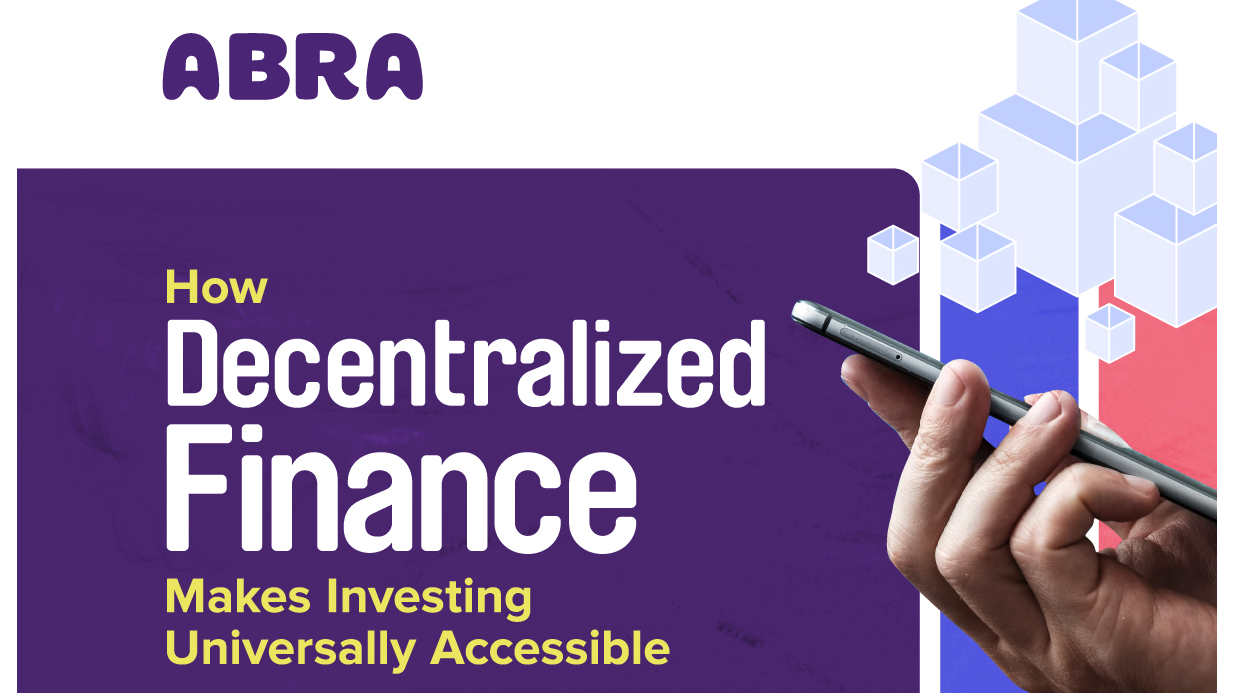The latest (and last) graphic in our four-part series with Visual Capitalist looks at Abra’s role in the future of decentralized finance.
Abra is building on Bitcoin to enable new kinds of financial products and services. These new decentralized financial systems share some basic characteristics:
- Direct: Crypto-based systems, like Abra’s crypto-collateralized contracts, eliminate the need for layers of third parties, which decreases costs and increases the efficiency of global investing.
- Location independence: Abra’s crypto-collateralized contracts make investment opportunities available around the world.
- Programmable money: Money is getting smarter. The ability to create multi-signature contracts and other programmable features of Bitcoin and cryptocurrency reduces friction by reducing the time and cost of financial transactions.
This latest graphic from the Visual Capitalist builds on three previous related stories.
- The first graphic looks at the seven major flaws of the global financial system. Among those flaws are the cost and inefficiencies associated with the traditional financial system including: a reliance on centralized systems, the continued lack of access to formal banking for 1.7 billion people, low financial literacy, high intermediary costs and slow transaction times, low trust in governments and financial institutions, rising global inequality, currency manipulation, and systemic risk.
- The second graphic looks at what decentralized finance is, and how it can be used to address the shortcomings of the current financial system.
- The third graphic in the series outlines how decentralized systems can be used to open access to investing and the larger financial system. The three main reasons for creating more (and simpler) investing opportunities are that people can use global markets to hedge against the inflation of traditional currencies, use investing to grow wealth through compounding, and diversify across different assets to protect wealth in challenging economic times.
Check out the latest graphic in the series that shows how Abra fits into all of this by building new kinds of financial products for a new kind of investing.
Check out the full story from Visual Capitalist:
About Abra
Established in 2014, Abra is on a mission to create a simple and honest platform that enables millions of cryptocurrency holders to maximize the potential of their assets. Abra enables both individuals and businesses to safely and securely buy, trade, and borrow against cryptocurrencies – all in one place. Abra’s vision is an open, global financial system that is easily accessible to everyone.
Why Abra
Based in the United States, Abra is available in over 150 countries and makes it easy to convert between crypto and a wide variety of local fiat currencies. With over 2MM customers, $7B in transactions processed, and $1.5B in assets under management, Abra continues to grow rapidly. Abra is widely loved and trusted – in April 2022, pymnts.com reviewed and rated Abra amongst the top 5 most popular crypto wallets in the market. Abra is backed by top-tier investors such as American Express Ventures and First Round Capital.
How Abra Protects Your Funds
Abra places clients’ financial objectives and security first. Abra practices a culture of risk management across all levels and functions within the organization.
Abra employs a state-of-the-art enterprise risk management framework that comprises a comprehensive set of policies, procedures, and practices detailing all applicable risk-related objectives and constraints for the entirety of the business. Abra has instituted a complete set of requisite systems and controls that continuously enforce these policies, procedures, and practices to manage all operations, including credit and lending. Abra’s independent Risk Committee comprises experienced compliance, risk, securities, and fraud operations professionals with backgrounds in industries ranging from traditional and digital assets banking, payments, remittance, to fintech.
Please visit our FAQ to learn more.




